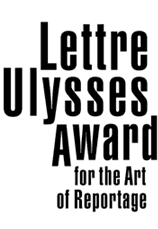
Svetlana Alexievitch, Belarus

“I had been searching for a literary method that would allow the closest possible approximation to real life. Reality always attracted me like a magnet, it tortured and hypnotized me. I wanted to capture it on paper, and finally I chose the genre of actual human voices and confessions, evidence from witnesses and documents. This is how I hear and see the world--as a chorus of individual voices and a collage of everyday details. This is how my eyes and ears function. In this way all my mental and emotional potential is realized to the full. I have to be simultaneously a writer, reporter, sociologist, psychologist and preacher.”
Svetlana Alexievitch, born in 1948 in the Ukrainian village of Ivano-Frankovsk, is a world-renowned journalist whose writings, theatre pieces, and screenplays have been reproduced and translated in over twenty different countries.
Her Belarusian father was a school headmaster, and her Ukrainian mother was a teacher. Even as a child, Alexievitch was aware of her family’s painful past: Eleven families members were victims of the war and the Stalin period.
Like her father, Alexievitch studied journalism at the Belarusian State University in Minsk. After finishing her studies, she remained in the city working as an editor, until being forcibly transferred to the Polish border for a year.
Her career began with the publication of two books on the Second World War. Two years of censorship elapsed after the completion of her first book, War's Unwomanly Face, before it was eventually published. Alexievitch then produced a volume of childhood memories about the war entitled Last Witnesses, which led officials to accuse Alexievitch of “pacifism and the un-heroic portrayal of the Soviet woman".
For its demystification of the Soviet invasion of Afghanistan, her third book Zinky Boys was vehemently attacked by both Communists and the Russian military. The volume was subsequently banned for ten years. Her following publication, Bewitched by Death (1993), investigates the problems of suicidal disturbances in a traumatized post-Soviet society, which has not yet come to terms with the ending of this period.
Her book Voices from Chernobyl: Chronicle of the Future, based on talks with hundreds of witnesses and victims of the 1986 nuclear catastrophe, contains both shocking evidence and profound analysis. For Alexievitch, Chernobyl is more than just an accident. It is a sign of how, with the radioactive catastrophe, an era of new dangers has dawned, an era which can only be measured in “astronomic time.” Chernobyl was a technical accident; an accident on the part of human understanding, but also more: a crisis in our world view.
Alexievitch has been involved in the making of 21 documentary films and has written various theater pieces. Her books have been published in 19 countries, and some have also been filmed, set to music, or dramatized. In 2002, she took part in the exhibition Die Kriegerinnen und der Tod: Das Schicksal der Frauen in der Roten Armee (Female Soldiers and Death: The Fate of Women in the Red Army), which was shown in the Deutsch-Russisches Museum Karlshorst, near Berlin. She also participated in Paul Virilio’s exhibition Ce qui arrive in the Parisian Fondation Cartier.
Her texts have received various international prizes including the Kurt Tucholsky Prize from the Swedish PEN 1996, the Triumph Prize for Russian Art and Literature 1997, the Leipzig Book Award for European Understanding 1998, the Prix Témoin du Monde (Witness of the World) from Radio France Internationale 1999, the Friederich Ebert Foundation Special Prize for the Best Political Book, and the Erich Maria Remarque Peace Prize 2001, among others.
Svetlana Alexievitch lives in France.
